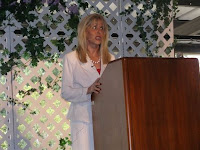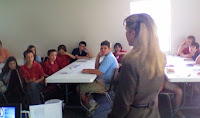Okay, 'fess up. Have you played with your wenis today?
Now don't start blushing - wenis is indeed a real word, and believe it or not, an actual part of your anatomy. One that you, no doubt, never knew you had. Go ahead, guess where your wenis is. Really. I'll give you a hint: it's
above your belly button (whew!) and below your Adam's apple. Everybody has not just one, but two. And the older you become, the more droopy your wenis gets.
Give up?
The wenis is the loose skin on the back of your elbow. Honest. I ain't funnin' ya. But that's my goal.
As a humorist, I'm often posed the question, "What's the secret to writing funny?"
Part of the answer is obvious: Writing funny first takes thinking funny. Maybe not gut-busting hysterical, HAHAHA-funny, but at least unexpected, off-the-beaten path funny. Take wenis, for example. It's a LOL term that I found on a list of words that just plain
sound funny as they roll off the tongue, along with "hornswoggle," "kinkajou," "rumpus," "wonky," "skuttlebutt," and "bumfuzzle."
Notice something those kooky words have in common - the use of hard consonants. For some strange, marvelous reason, words containing hard consonants - k, j, g, t, p, z - elicit grins simply by their guttural sounds. Yes, it's krazy but true and it's called the K Rule. This nifty little humor tool has long been used by comics to subconsciously coax laughs from their audiences and by writers, especially in newspaper headlines or book titles, to amuse their readers.
And drive sales.
Another cool tool humorists employ is the Rule of Three. Yep. Yours, mine and Uncle Sam's. Tom, Dick, and hairless. Get it? You set up a series of three commonly used words or phrases, and then throw an unexpected wrench in at the end. Something completely out of line with the other two to grab attention and jar your listener or reader from his mindless hibernation. Shakes up the gray matter and will likely draw a laugh. Or at least a raised eyebrow and any reaction is better than none.
One my favorite humor mechanisms, which also relies on successful misdirection, is the cliche contortion. Like the Rule of Three, you're setting up the reader by leading him to expect a certain conclusion to a familiar cliche, then jerk the chair out from under him at the last minute.
For example, "She ran like the wind" becomes "She ran like a fat rabbit in front of a skinny coon dog." Or Lyla Blake Ward's clever book title,
How to Succeed at Aging Without Really Dying. Ha! That one makes me snicker every time I see it.
If you've read my book,
Mom NEEDS Chocolate, you'll already know that much of my humor is driven by anecdotes ... funny true stories, the spice of life that people identify with from their own goofy experiences. Wonderful examples of writers who lean heavily on anecdotal humor are Dave Barry, Karen Scalf Linamen, Patsy Clairmont, and the late, great Louis Grizzard and Erma Bombeck. We love to hear about the almost-unbelievable-but-so-ridiculous-it's-probably-true things that happen in real life. And we learn life principles from not just our own experiences, but from the entertaining escapades of others.
I've received so much positive feedback from my stories resonating with readers that I'm using the same anecdotal approach with my upcoming books,
Too Blessed to Be Stressed and
More Beauty, Less Beast.
And of course, timing is the key to great humor, both verbally and written ... placement of the punchline after a perfect buildup. For inspirational writing, it's when and where to strategically make your point after using a slam-bang-up story to prepare the reader to receive it. Like preparing to indulge in a top sirloin, your preamble is the marinade that softens and flavors the meat for peak enjoyment. If the timing is off and you take a big ole bite of the steak before it's finished cooking, you're going to miss the climax of the experience.
And the point.
Good humor allows for slight lapses and perhaps an occasional moment of dead air. But
great humor slams the nail down on the hilarity coffin. Bob Hope was the master of verbal comedic delivery, and one of his joke writers, Martha Bolton, is an excellent contemporary example of nailing written humor with perfect timing. That woman cracks me up!
So remember, humor is a terrific way to hook readers, whether fiction or nonfiction. Humor lightens the atmosphere, softens the heart and cracks opens the closed mind.
Now, let go of your wenis and write on!



























